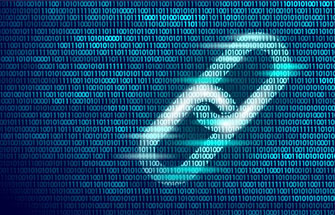Whether it’s a passing fad or a genuine revolution, the term “blockchain” is popping up in conversations from neighbourhood cafés to the most serious circles.
What exactly is it? It is a digital transaction recording system which is based on trust, fully secure, shared online by members of a community, and makes it possible to cut out intermediaries.
What intermediaries? In theory virtually all of them, including both financial intermediaries and various service providers.
What springs to mind first when you hear the word “blockchain”? Cryptocurrencies, virtual “alternative” currencies which have no physical existence and whose value has recently exploded. They can be used to make financial transactions and can be exchanged for services or money via online trading platforms, all at low costs and completely anonymously.
Given this context, a frightening one for many industries and one which raises essential questions about security, why is Monaco, like many other countries, considering creating a regulatory framework to allow the use of blockchains and open up the possibility “Initial Coin Offerings” or “ICOs,” as is already the case in Switzerland and Singapore? The answer is fairly simple: it is betting that this digital revolution will generate value and jobs in the short-term, and aims to protect both subscribers and governments from the clear risk of abuses generated by anonymous transactions.
It is against this backdrop that Bill 237 was sent before Monaco’s Legislation Commission last December.
The bill provides for a three-year test period for blockchains, smart contracts, algorithmic businesses, and cryptocurrencies. All contracts and applications would be subject only to Monegasque law.
During this test period, a private institution called the “Autorité Monégasque des Blockchains” (Monegasque Blockchain Authority, AMB) would be created and tasked with monitoring application of the law and regulation of the areas within the scope of the test on behalf of the government and, where necessary, performing inspections and sending any violations to the appropriate authorities for investigation and, as appropriate, sanctions. The AMB members and chairman, who would be appointed by a sovereign order, would also be responsible for providing information to the public and, if necessary, creating a mediation programme.
It is, in fact, essential to reconcile two radically different approaches to the field: enabling the development of innovation while protecting public and private interests from the dangers that could arise from deregulating transactions, particularly financial transactions.
The challenge is a major one and potentially a source of endless debates, going beyond the clear principles laid out in this Bill.
The questions are both security-related - are these technologies really hack-proof? - and legal. It is clear that the principle of liberty, even for experimental purposes, will clash with numerous specific regulations. These include the regulations on personal data protection, the proof of consent required in certain cases (GDPR), compliance with the powers specifically assigned to various financial control commissions, etc.
In short, we are confronted with numerous uncertainties, just as we were in the past when we first faced the changes without which we would be lost today. It is impossible to foresee and regulate everything in advance.
Given the speed at which technology is changing, we should be flexible while also heightening compliance with the measures required to prevent potential abuses.
KPMG GLS & Associés
2, rue de la Lüjerneta
98000 Monaco
Tél. (+377) 97 77 77 00
www.home.kpmg.com/mc
Gordon S. Blair
7, rue du Gabian
98000 Monaco
Tél. (+377) 93 25 85 25
www.gordonblair.com






